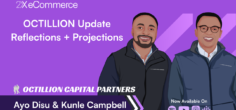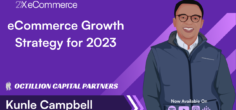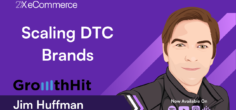Podcast
Learn from Fast Growing 7-8 Figure Online Retailers and eCommerce Experts
The Power of a Brand-First Strategy: Our Journey After Acquiring an Amazon-First Business
On today’s episode is Kunle, Co-Founder of Octillion, an acquisition platform company of “clean” skincare, food, and beverage brands.
On his another solo podcast, Kunle reflects on things he had learned from September 2022, when his partner in Octillion, Ayo Disu came to the podcast as a guest. Kunle and Ayo talked about their plans for Octillion and their newly acquired brands at the time, Lean Caffeine and Clean & Pure.
Kunle bares the good, the bad, and the ugly in the process of growing a business or a company, from an investment that didn’t come through and to knowing more about their own company. They did process analysis, customer research, and finance which is building a good relationship with their banks and suppliers.
It’s an interesting episode as you’d hear Kunle talk more about what Octillion has been doing to grow, their in-depth look into Octillion and their acquired companies as well as its customer research and finance perspectives.
Here is a summary of some of the most important points made:
- To get to know your business on a deeper level, you can do a process analysis.
- Looking into finance is important and you have to look at it from different perspectives.
- Connect with your suppliers and share with them your values and ethos.
- Octillion has doubled down on some of its products and instead is creating more variations of the products that are doing well.
- Having a co-founder is a good way to balance things and bounce ideas off with each other.
Covered Topics:
On this episode, Kunle discusses:
- Updates with the Octillion Acquisition
- Knowing the Business Processes
- Doing a Customer Research
- Finance is Key
- Looking at SKUs and Products
- Connecting with Suppliers
Timestamps:
- 01:18 – Updates with the Octillion Acquisition
- Kunle transitioned to co-founding Octillion in 2022.
- In September 2022, Ayo Disu came into the podcast to talk about Octillion.
- In 2022, Octillion acquired Lean Caffeine and Clean & Pure, Amazon-first businesses.
- Their objective is to transition the revenue from being exclusively Amazon to D2C revenue and direct sales.
- 08:46 – Knowing the Business Processes
- A potential investment in 2022 didn’t come through.
- He shared his unique perspective on a business’ trajectory in the first twelve months.
- Kunle thought of getting to know Octillion and its companies deeper by doing a business process analysis.
- It took them eight weeks to get everything on board and they also hired an eCommerce manager to help them out managing the Amazon side of the business.
- Documentation is critical in a business.
- 14:18 – Doing a Customer Research
- Kunle and his team conducted customer research to understand why people buy their brands.
- Not being able to reach out to their Amazon customers and only relying on their customer data, they were able to understand the brand core which is empowering.
- Brand-first means working on the marketing message first.
- 18:25 – Finance is Key
- They went into market in September 2022 but people would say that it was the wrong season.
- “Finance is important and the use of debt is important.”
- Look at your finances on a daily, weekly, and monthly basis.
- It is important to build relationships with your suppliers and bank.
- “The use of debt is important.”
- 24:32 – Looking at SKUs and Products
- They have doubled down on some products and are currently horizontally expanding.
- “We give customers who want to buy value an opportunity.”
- 25:48 – Connecting with Suppliers
- “It’s not a popularity contest.”
- “Nurture relationships with suppliers and grow.”
Takeaways:
- Documentation is a critical part of a business.
- Octillion has been a brand-first company which means they work on their words or marketing message first.
- It’s important to look at your finance data on a daily, weekly, and monthly basis and look into it from various angles.
- Build good relationships with your suppliers and bank.
- “For me, having a co-founder is good to bounce ideas off and get data off and balance things out.”
Links & Resources:
- Octillion
- Jake Karls – past episode
- William Harris – past episode
- Peter Beckman – past episode
- Mike Abadi – past episode
- Yong-Soo Chung – past episode
- Marius Laza – past episode
- Lean Caffeine
- Clean & Pure
- Apple Podcast – 2X eCommerce
- Spotify – 2X eCommerce
- Twitter – Kunle Campbell
- Kunle@2xecommerce.com
Facebook Group • Continue the Conversation
The eCommerce GrowthAccelerator Mastermind Facebook Group has just launched.
It is a community…
✔️ for founders and experts passionately involved in eCommerce
✔️ for the truly ambitious wanting to make an impact in the markets they serve
✔️ for those willing and open to help and share with other members
Here is where to apply to join the Facebook group
>>http://bit.ly/ecommercefb<<
———–
SPONSORS:
This episode is brought to you by:
![]()
This episode is brought to you by Recharge, the leading subscriptions payment solution for Shopify merchants.
Recharge helps ecommerce merchants of all sizes launch and scale subscription offerings. Recharge powers the growth of over 15,000 subscription merchants and their communities—turning one-time transactions into long-term customer relationships.
Turn transactions into relationships and experience seamless subscription commerce with Recharge.
Find out more on rechargepayments.com/2x.

This episode is sponsored by Tidio, the highest-rated live chat app on Shopify. Tidio is a versatile platform that offers personalized shopping experiences, boosts customer satisfaction, and manages all communication channels on one dashboard. It can automate up to 47% of recurring questions with its deep Shopify integration.
With the budget-friendly Tidio Plus Plan, you get a dedicated customer success manager, personalized training sessions, and more. Tidio powers over 300,000 brand websites, including Shell, Wellbots, and Valyou Furniture. Head to Tidio.com/2X to take control of your customer relationships and supercharge your growth.
Transcript
On this episode, you’re going to learn about the good, the bad, and the ugly of the eCommerce acquisition we made back in September 2022.
—
Welcome to the 2X eCommerce Podcast. This is the podcast dedicated to rapid growth for eCommerce. We have been on air since November 2014 and we keep going. It’s all about consistency. For those who are tuning in for the first time and don’t know who I am, I am Kunle Campbell, and I’m your host. Each week, the typical format of this podcast is I interview people who I deem to be experts, people who I deem will add value, and people who I deem will change the way you operate your eCommerce businesses, the way you turn up as an employee or an agency supporting an eCommerce business. That’s what we do, we bring interesting guests.
I made a promise back on the 30th of January 2023 that I would catch up with you guys from time to time and give you an insider view and give my reflections on what we do. For those of you who don’t know what I do, the podcast is one of the things I do. I used to be a full-time customer acquisition consultant and I used to buy traffic. I still do have a small team and we do media buying along with a plethora of other things like conversion rates, optimization, and advice on eCommerce growth in general.
In 2022, I transitioned to co-founding a company called Octillion. What we do is we acquire good-for-you food and beverage small companies and we are looking to scale and grow them over time. That’s what Octillion is, we focus on the food and beverage space as well as on the skincare brand. We have one brand in our portfolio and we’re looking to add another two this 2023 so that’s fun.
Since January 2023, which is the final episode of season seven, this is season eight now, and this should be episode nine in season eight. We’ve had Jake Karls, William Harris, Peter Beckman from Treyd, Mike Abadi, Yong-Soo Chung, and Marius Laza from Tidio, all phenomenal speakers with interesting insights. Some are from operators, from an agency perspective, a finance perspective, and a tech perspective. There are different ways to help you grow. I’ve learned a lot thus far and I wanted to reflect on the lessons we’ve learned.
To give you some context, back in September 2022, Ayo Disu came on this show and we successfully acquired a superfood and a coffee brand combined together, 2 brands in 1 company, called Lean Caffeine and Clean & Pure. They were an Amazon-first business and we acquired them in September 2022. The deal size was about $1 million and then it was about £800 £1,000. At the time, it was exciting for us, it was a huge milestone for us, and we proceeded to start to operate this business.
Being Amazon-first, as you know, all in all, I’m a D2C person. One of our objectives is to transition the revenue of this business from being almost exclusively Amazon to it having some direct-to-consumer revenue, like for like, if not more, as well as also working on direct sales. Direct sales being sales to B2B as well as sales to retail. That’s a longer template but the B2B is coming fairly soon.
Why this episode? What do I want to share in this episode? I want to share certain things we’ve done. I want to reflect on what we’ve done since September 2022 to date and I want to give you the good, the bad, and the ugly post-acquisition and our plans moving forward. I’ll give you a little bit of an update. On the next episode, you will get a typical interview. We have some phenomenal guests. Let’s jump right in.
We had a conversation with a potential investor in 2022 and his investment didn’t come through. He’s more of a traditional acquisition person. He acquires laundromats, petrol stations, he’s that sort of an acquirer, some corner shops, and all of that stuff. One of the questions he asked was, “What would you guys do in the first twelve months of running the business? “I went gung-ho, I was like, “We’ll do this. We’ll do that. We’ll change this. We’ll change that.” He looked at us and was like, “Huh?”
He paused and coming from where he’s coming from and giving us his unique perspective, he’ll do nothing. That, to me, was counterintuitive. How the heck would you do nothing? What trajectory do you want the business to go, upwards or downwards? How can you do nothing? He was like, “It’s simple.” He’ll do nothing because he’s listening more than he’s doing. He needs to know what is going on. he needs to know exactly what is going on in the business.
Once he gets the ebbs and flows of the way business works both operationally from a marketing standpoint, sales, and all of that stuff, he can start to make master moves. In fact, that is the point of absorption and that’s the point of strategic planning. It makes sense but it does not make sense. From my marketing agency point of view or perspective, clients will come to you for you to change stuff, to change the trajectory of a business through marketing, it’s that simple.
We are generating 200 sales a day and we want to grow this order volume to 500 sales a day, that’s the typical remit. Our target cost per acquisition is X. For me, how can you apply those principles, which is a pretty solid thesis to an existing business you acquire? That makes sense. I’ll step back a little bit and say that sometimes when people say, “Give you advice,” you don’t necessarily need to go 100% in advice but you could take certain things away from that advice and that’s what I did.
My thoughts were like, “Let’s try and get to know this business deeply.” We did what not many acquirers do, which is we got a process analyst. What did this business process analyst do? She was an attachment to our team and she interviewed every key personnel involved in the business. She extracted the processes, diagrammed them out, wrote notes, and we had a manual. She helped us create a process manual, which we update every quarter.
If you ask me, “how’s the supply chain for this particular product? What goes into it?” I need to go to a file and look at what happened, I know the suppliers, I would know who puts it together, I would know what the lead times are, and I’ll know the cost of goods, everything. The thing is we can’t just put these things in our brains. We have to sort of have an external brain. Documenting what was going on in the business was critical.
It took us maybe eight weeks or two months to get everything on board. It was critical to capture what was going on. that time got us to say, “This is how we’re going to put a plan together.” That formed the foundation of our next steps. We didn’t go gung-ho until we were going to change the website and do all of that stuff. Yes, all that needs to be done but we needed to understand how the business works, particularly given the fact that neither Ayo nor myself are Amazon experts. Also, for some context, we also hired an eCommerce manager who got in place to help us out with managing the whole Amazon bit. It was left to us to ask him the right questions.
Without going into too much detail, what was the second key thing we’ve done over the course of acquiring the business? The second thing is customer research. I’m still speaking to the phase of knowing about the business, as in knowing about the business. One is capturing processes and the second bit about knowing about the business is knowing the customers of the business. We’ve conducted deep customer research and understand why people buy the brand.
This brand has about 36% returning customer rate retention. Why do this 36% of people come back again and again? With Amazon, you can’t reach out to this 36% of people because Amazon doesn’t allow you to reach out to their customers. We had to lean on our customer data and it painted a picture. It crystallized our understanding of the brand core as is. We started to understand, “This is the messaging in the brand that has worked. This is what people have hooked onto in the messaging. This is why they continue to patronize us.” That in itself was empowering for us to understand our customers.
Every marketing partner we’ve had or intend to have also needs to get a grasp of this information. When they are crafting their messages externally, it’s in sync with that tempo if that makes sense. I’d employ you to do that. Sometimes a lot of brands lose their bearing, they lose their direction, they lose their core, and they don’t know. With customer research, it’s important to get that feeling again from customers and know their why. I found that empowering and implore you to do that.
What else have we done? We have been brand-first. What do I mean by brand-first? Brand-first means we’re working on our words first, it means we’re working on our marketing message first. It means figuring out how we turn up visually to the public. It’s something that we’re doing and it’s still a work in progress. It’s super important to understand. It’s not visual first, it’s words first. You need to articulate and conceptualize what you are in words and believe that in words and then give every other partner that remit that this is what you are.
We understand that, with this acquisition, we’re a good-for-you brand with clear ingredient lists, no rubbish, and no baddies in our ingredient list, clean and pure. Every other decision, whether it’s an operational decision, whether it’s a product sourcing decision, whether it’s a marketing decision is founded on that core, on those words. That’s been critical and important for us, to be brand-first.
The third thing is finance is key. We go into the market in September 2022 and we could start to see the tempo in the capital market. It was the wrong season, that’s what people would say. Finance is important and the use of debt is important. I brought Peter Beckman from Treyd. We’ve been customers of Treyd. Treyd is similar to invoice financing. Their verbiage is more supplier financing. We do that to buy time.
Finance is important. Ayo, my business partner, handles a lot of the finance. We’re building relationships with our bank and suppliers. Looking at our cash conversion cycle is important. It’s important to get a hold of finance. Without a blink of an eye, monthly financial, we look at the finance data. I look at sales data on a daily basis. You have to look at things on a daily.
Most importantly, try and look at it daily, weekly, monthly, and quarterly. Look at it from various angles, from various segments. Sometimes the aggregate doesn’t tell the story all the time. Zoom in, zoom out, and look at it from different perspectives, and then make effective decisions. For me, having a co-founder is good to bounce ideas off and get data off and balance things out.
What’s the next thing we’ve done? We’ve looked at SKUs and products. We’re discontinuing some products. We’ve doubled down. One thing we’ve done, which has worked phenomenally well on Amazon, is looking at existing products that are doing well, and we’re saying, “How many variations do we have there?”
We’re horizontally expanding with variations. Let’s say we have a single bag of 400-gram coffee, we are creating a one-kilo variation of that. We give customers who want to buy value an opportunity. That also is reflected in the price and their price savings. Those small hacks are increasing order volume. People focus on marketing but if you look inward sometimes at their efficiencies, you can establish to help.
The other is connecting with suppliers. What I mentioned in the context of suppliers prior was more around finance but it’s about relationships. I always picture this, is my relationship strong enough for a supplier in the event that they have their last thousand units and they have an option of customers they want to give it to? I will be the first customer they choose.
It’s not a popularity context. How do you genuinely build relationships? We’ve shared our vision with them and our ethos with them. We want to continue to nurture those relationships with suppliers and grow. Supplier relationships have been important. Those are the major points I wanted to make. There are many other things I will catch up with. We are working on two major things right now. I don’t want to discuss it right now till certain milestones have been hit.
If you like this format of the episode, let me know. I like it a lot. I feel I’m speaking to you guys. If you found any value, hit the follow button on your podcasting app. If you are listening to this on Apple Podcast, you have the ability to leave us a review. If you listen to this on Spotify, Spotify now allows a star selection review. You can’t write a review per se but you could leave us a 5-star or 4-star, that is if this has been of value to you.
I’ll continue to do these episodes every now and then so you gauge how we are doing and I can give you tips and I can give you what we are seeing from our unique point of view. I’d like to hear you, reach out to me. Some people have reached out to me on Twitter. Others have reached out to me by email directly. My email is Kunle@2xecommerce.com. That’s it. Enjoy the rest of the week. I’ll catch you later. Cheers.





